Joseph Lauber
Musikarchiv-Serge Schmid
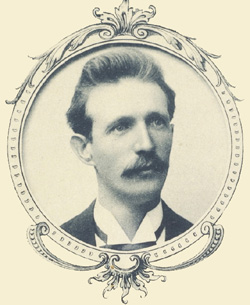
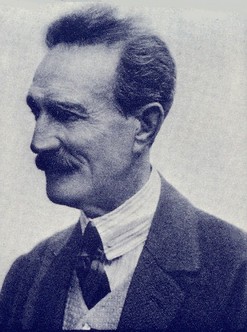
Anton Joseph Lauber (* 27. Dezember 1864 in Ruswil; † 28. Mai 1952 in Genf)
Bereits in frühen Jahren trat Lauber als Pianist in einem Orchester auf, das sein Vater leitete. Ein Mäzen ermöglichte ihm 1881 den Eintritt in das Konservatorium Zürich, wo er Schüler von Gustav Weber und Friedrich Hegar wurde. Sein Studium setzte er 1884 in München bei Joseph Rheinberger (Orgel) und am Conservatoire de Paris bei Louis Diémer und Jules Massenet (Klavier und Komposition) fort. Nach einigen Jahren als Organist in Le Locle (Kanton Neuenburg) lehrte er selbst von 1899 bis 1901 am Konservatorium Zürich und übersiedelte dann nach Genf. Dort war er für zwei Jahre Theaterkapellmeister und seit 1907 Professor für Klavier und Instrumentation am Konservatorium Genf, ab 1917 Professor für Komposition. Zu seinen Schülern in Genf zählten Henri Gagnebin und insbesondere Frank Martin.
Laubers über 200 Nummern umfassendes Werkverzeichnis deckt nahezu alle musikalischen Gattungen ab. Neben einer Oper schrieb er unter anderem 6 Sinfonien, Sinfonische Dichtungen, 2 Klavierkonzerte und 2 Violinkonzerte, zahlreiche kammermusikalische Werke und Vokalkompositionen.
Sein Stil fusst einerseits in der deutschen Spätromantik, nimmt aber andererseits Einflüsse des französischen Impressionismus auf. Er selbst schätzte insbesondere die Musik von Claude Debussy, Gabriel Fauré und Henri Duparc.
Quelle: Wikidata
* 27.12.1864 Ruswil LU, † 28.5.1952 Genève. Pour l’état civil, Anton Joseph L. Frère d’→Émile L., compositeur.
Après une enfance à Neuchâtel (1869-80) où son père, tailleur et violoniste amateur, dirige un petit orchestre de brasserie, L. étudie la musique avec Friederich Hegar, Fritz Blumer, Gustav Weber et Robert Freund au Conservatoire de Zurich (1881-83). En 1884, il se perfectionne auprès de Joseph Rheinberger à Munich. Il est organiste à Serrières (1884-86) et au Temple français du Locle (1885). Il fréquente ensuite le Conservatoire de Paris (1892), où il travaille le piano avec Louis Diémer et la composition avec Jules Massenet. Il enseigne le piano au Conservatoire de Zurich (1897-1901) puis il prend le poste de premier chef d’orchestre du →Grand Théâtre de Genève (1901-03). Il y dirige notamment la première représentation genevoise de Louise de Gustave Charpentier (1903). Il enseigne au Conservatoire de Genève (1901-51), successivement le piano dès 1901, les formes et styles (1902-27), l’instrumentation dès 1902, l’improvisation dès 1910 et la composition libre dès 1927. Il a notamment comme élève →Frank Martin, →Richard Flury, Henri Gagnebin, →André-François Marescotti, Rudolf Moser et →Bernard Reichel. Compositeur, il laisse une production abondante où domine musique instrumentale et œuvres chorales. Sa contribution au domaine lyrique se limite à un opéra, probablement inachevé, La Sorcière, sur un livret d’Isabelle Kaiser, et à deux festspiels: Neuchâtel Suisse (1898) sur un livret de Philippe Godet et L’Île de la paix, présentée à l’occasion de la fête cantonale bernoise de chant à Bienne (1934) qu’il compose avec son frère Émile. Il reçoit le titre de docteur honoris causa de l’Université de Neuchâtel (1941).
JOSEPH LAUBER (b. 1864 Ruswil - d. 1952 Annecy) was a noted Swiss composer, organist and teacher. As a boy, Joseph gained valuable musical experience playing piano in his father's light orchestra. More formal training would come in 1881 when, with the support of a patron, he entered the Zürich Conservatoire where he studied voice, harmony, composition and music history; and took organ lessons with Gustav Weber and piano lessons with Fritz Blumer and Robert Freud. In 1884 Lauber sought to further refine his technique and moved to Munich to study with the celebrated organist and pedagogue Joseph Rheinberger. A few years later he traveled to Paris to study composition with Louis Diémer and Jules Massenet at the Paris Conservatoire. Following his studies, Lauber spent several years as an organist in the canton of Neuchâtel and taught piano at the Zürich Conservatoire from 1899-1901. Eventually, he settled in Geneva where he lived for the remainder of his life, teaching at the local Conservatoire and serving as music director of the Grand Théâtre de Genève. In addition to composing, Lauber co-founded L'Association des Musiciens Suisses in 1900, an organization which premiered a number of his works and still actively promotes Swiss composers and their music today under the more inclusive name L'Association Suisse des Musiciens.
Joseph Lauber greatly admired the music of Debussy, Fauré and Duparc. His own compositions combine the harmonies and textures of the French Impressionists with the formal structures of the German Romantics - with a dose of local Swiss color thrown in for good measure. A prolific composer, his output includes over 200 works in nearly every genre including an opera, an oratorio, 6 symphonies, 5 concertos, and a large catalogue of chamber music for a variety of ensembles.
Quatre Intermezzi for Flute, English Horn, Clarinet and Bassoon
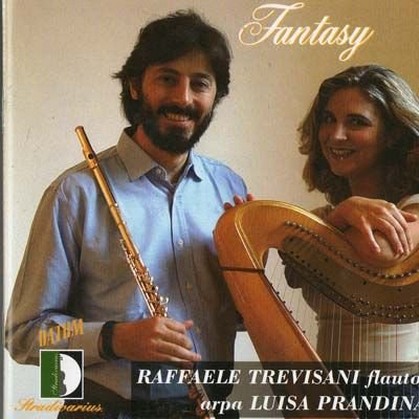
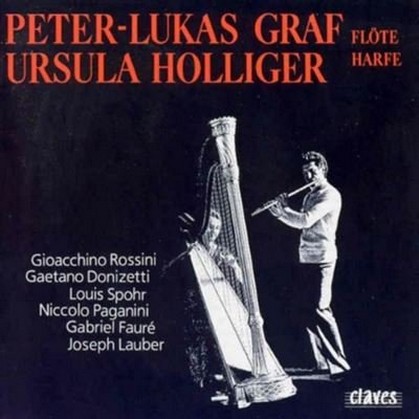
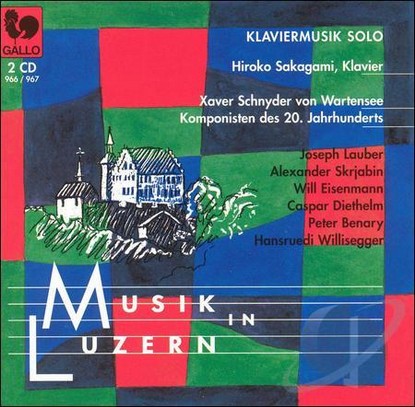
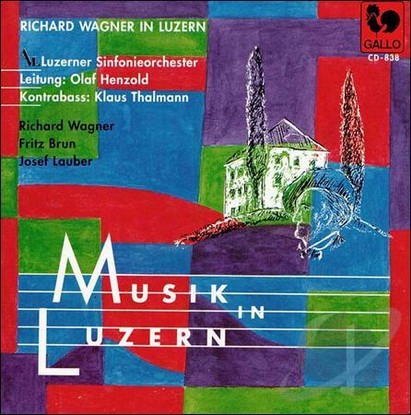
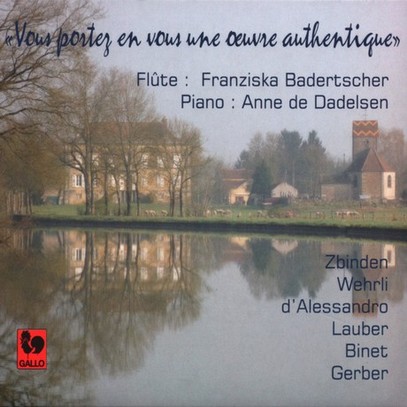
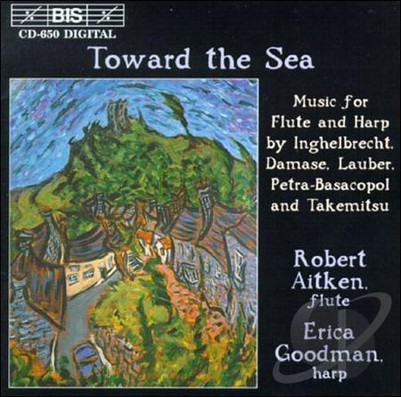
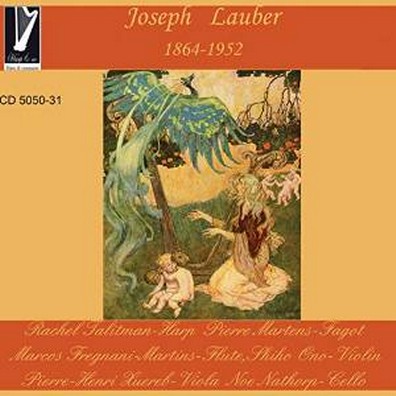
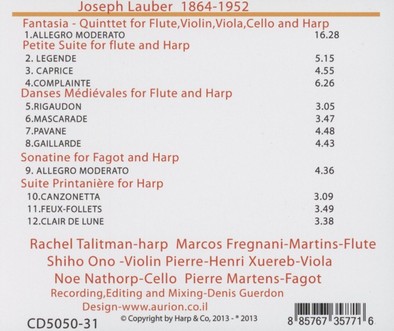
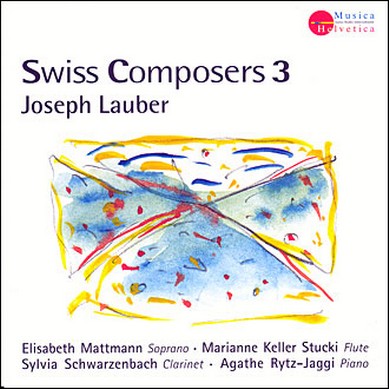
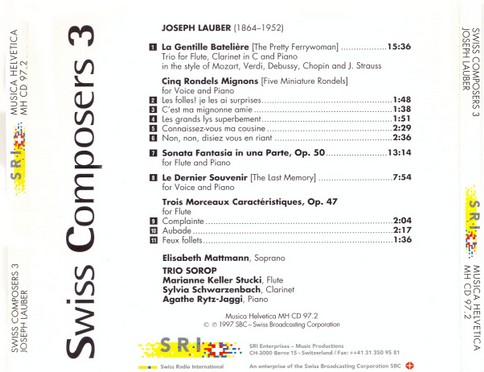
The Quatre intermezzi pour Flüte, Cor Anglais, Clarinette et Basson was originally published by Henn in 1922 under the auspice of L'Association des Musiciens Suisses. Serious in scope and sounding particularly Gaelic in character, this delightful pettifour offers a kaleidoscope of reed colors and includes one of the best barrel organ tunes ever written. Not even the addition of the normally somber English Horn can dampen the works sunny disposition, and like any good dessert, it satisfies the palate while leaving one craving for more. 18 minutes.
MJC1023
Lauber: Quatre Intermezzi










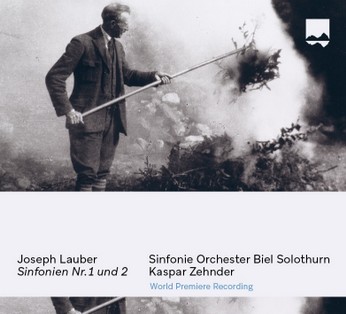
-eine Schweizer Sinfonik-Wiederentdeckung als Weltersteinspielung - Release Ende November
Serge Schmid
Oberstrasse 25
CH-3550 Langnau
+41 (0) 34 402 67 33
sergeschmid@gmx.ch
Copyright © 2015. All Rights Reserved.
Webdesign by Serge Schmid
